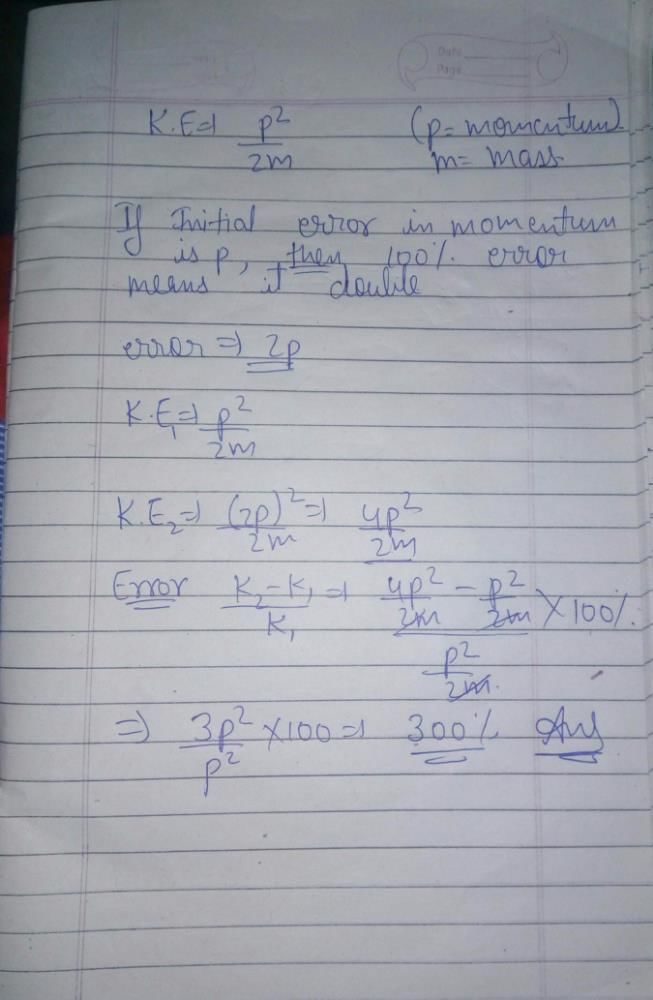NEET Exam > NEET Questions > If the error in measurement of momentum of a ...
Start Learning for Free
If the error in measurement of momentum of a particle is ( 100%), then the error in the measurement of kinetic energy is?
Most Upvoted Answer
If the error in measurement of momentum of a particle is ( 100%), then...
Explanation of Error in Measurement of Momentum and Kinetic Energy
Definition of Momentum and Kinetic Energy
Momentum is the product of the mass and velocity of an object and is a vector quantity. It is denoted by 'p' and is given by the equation p = mv.
Kinetic energy is the energy possessed by an object due to its motion and is a scalar quantity. It is denoted by 'K' and is given by the equation K = 1/2mv².
Error in Measurement of Momentum
When we measure the momentum of a particle, there is always some uncertainty associated with it. This uncertainty is due to the limitations of the measuring instruments and the method used to take the measurement. The error in measurement of momentum is given by Δp/p, where Δp is the uncertainty in momentum and p is the actual momentum of the particle.
If the error in measurement of momentum is 100%, it means that Δp/p = 1. This implies that the uncertainty in momentum is equal to the actual momentum of the particle.
Error in Measurement of Kinetic Energy
The error in measurement of kinetic energy is given by ΔK/K, where ΔK is the uncertainty in kinetic energy and K is the actual kinetic energy of the particle.
To find the error in measurement of kinetic energy, we first need to find the relationship between the uncertainty in momentum and the uncertainty in kinetic energy. This can be done using the following equation:
ΔK/K = 2(Δp/p)
Substituting the value of Δp/p as 1, we get:
ΔK/K = 2
This implies that the error in measurement of kinetic energy is 200%. In other words, the uncertainty in measurement of kinetic energy is twice the actual value of kinetic energy.
Conclusion
In conclusion, if the error in measurement of momentum of a particle is 100%, then the error in the measurement of kinetic energy is 200%. This is because there is a direct relationship between the uncertainty in momentum and the uncertainty in kinetic energy.
Community Answer
If the error in measurement of momentum of a particle is ( 100%), then...

Attention NEET Students!
To make sure you are not studying endlessly, EduRev has designed NEET study material, with Structured Courses, Videos, & Test Series. Plus get personalized analysis, doubt solving and improvement plans to achieve a great score in NEET.

|
Explore Courses for NEET exam
|

|
Similar NEET Doubts
If the error in measurement of momentum of a particle is ( 100%), then the error in the measurement of kinetic energy is?
Question Description
If the error in measurement of momentum of a particle is ( 100%), then the error in the measurement of kinetic energy is? for NEET 2024 is part of NEET preparation. The Question and answers have been prepared according to the NEET exam syllabus. Information about If the error in measurement of momentum of a particle is ( 100%), then the error in the measurement of kinetic energy is? covers all topics & solutions for NEET 2024 Exam. Find important definitions, questions, meanings, examples, exercises and tests below for If the error in measurement of momentum of a particle is ( 100%), then the error in the measurement of kinetic energy is?.
If the error in measurement of momentum of a particle is ( 100%), then the error in the measurement of kinetic energy is? for NEET 2024 is part of NEET preparation. The Question and answers have been prepared according to the NEET exam syllabus. Information about If the error in measurement of momentum of a particle is ( 100%), then the error in the measurement of kinetic energy is? covers all topics & solutions for NEET 2024 Exam. Find important definitions, questions, meanings, examples, exercises and tests below for If the error in measurement of momentum of a particle is ( 100%), then the error in the measurement of kinetic energy is?.
Solutions for If the error in measurement of momentum of a particle is ( 100%), then the error in the measurement of kinetic energy is? in English & in Hindi are available as part of our courses for NEET.
Download more important topics, notes, lectures and mock test series for NEET Exam by signing up for free.
Here you can find the meaning of If the error in measurement of momentum of a particle is ( 100%), then the error in the measurement of kinetic energy is? defined & explained in the simplest way possible. Besides giving the explanation of
If the error in measurement of momentum of a particle is ( 100%), then the error in the measurement of kinetic energy is?, a detailed solution for If the error in measurement of momentum of a particle is ( 100%), then the error in the measurement of kinetic energy is? has been provided alongside types of If the error in measurement of momentum of a particle is ( 100%), then the error in the measurement of kinetic energy is? theory, EduRev gives you an
ample number of questions to practice If the error in measurement of momentum of a particle is ( 100%), then the error in the measurement of kinetic energy is? tests, examples and also practice NEET tests.

|
Explore Courses for NEET exam
|

|
Suggested Free Tests
Signup for Free!
Signup to see your scores go up within 7 days! Learn & Practice with 1000+ FREE Notes, Videos & Tests.

























